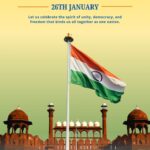Republic Day: A Complete Guide to Its History, Significance, and Impact
Introduction
Republic Day is a significant national event celebrated in many countries, marking the day when they officially became a republic. In India, Republic Day is observed on January 26th each year with grandeur and patriotism. It commemorates the adoption of the Indian Constitution, which came into effect in 1950, replacing the Government of India Act (1935) and establishing India as a sovereign, socialist, secular, and democratic republic.
History
The roots of Republic Day in India can be traced back to the struggle for independence from British colonial rule. After gaining independence on August 15, 1947, India needed a permanent constitution to govern the country effectively. The drafting committee, led by Dr. B.R. Ambedkar, finalized the Indian Constitution, which was adopted on November 26, 1949, and came into effect on January 26, 1950, to honor the anniversary of the 1930 declaration of Purna Swaraj (complete independence).
Significance
It holds immense significance as it marks:
- The transition of India into a fully sovereign republic.
- The enforcement of fundamental rights and duties of citizens.
- A celebration of the diversity and unity of the nation.
- An opportunity to honor the sacrifices of freedom fighters and visionaries.
Observance
The Day in India is celebrated with enthusiasm and pride. The main event takes place in New Delhi, featuring a grand parade at Rajpath, showcasing:
- Military Might: A display of India’s defense capabilities.
- Cultural Heritage: Diverse cultural performances from different states.
- Tableaux: Floats representing various states and government initiatives.
- Presidential Address: The President of India hoists the national flag and gives a speech.
- Bravery Awards: Recognizing the contributions of civilians and armed forces.
Facts
- First Celebration: The first Republic Day was celebrated on January 26, 1950.
- Chief Guest Tradition: Every year, India invites a distinguished foreign leader as the chief guest.
- Longest Constitution: The Indian Constitution is one of the world’s longest, with 448 articles in 25 parts.
- National Holiday: Republic Day is a national holiday across India.
- Parade Duration: The Republic Day parade lasts for about three hours.
Daily Life Impact
It instills a sense of patriotism and unity in the daily lives of citizens. Schools, offices, and residential communities organize flag hoisting ceremonies, cultural programs, and patriotic songs to spread awareness about national values. It also serves as a reminder of the responsibilities every citizen has towards the nation.
Wishing People
Here are some thoughtful ways to wish others on Republic Day:
- “Happy Republic Day! Let’s cherish our freedom and democracy.”
- “Proud to be an Indian! Wishing you a joyful Republic Day.”
- “Let’s honor our Constitution and strive for a better tomorrow. Happy Republic Day!”
FAQs
Q: Why is Republic Day celebrated on January 26th?
A: It marks the day when the Indian Constitution came into effect in 1950.
Q: What is the importance of Republic Day?
A: It signifies India’s transition to a sovereign republic with an independent constitution.
Q: How is Republic Day different from Independence Day?
A: Independence Day marks freedom from British rule, while Republic Day celebrates the adoption of the Constitution.
Q: Who was the chief architect of the Indian Constitution?
A: Dr. B.R. Ambedkar is considered the chief architect of the Indian Constitution.
Important Points to Remember
- It is a symbol of India’s democratic values.
- It highlights the unity in diversity of the nation.
- Every Indian should actively participate in the celebrations and uphold constitutional values.
- Schools and government offices conduct various competitions and events to educate people about the significance of the day.
Importance of Republic Day to Society
It serves as a crucial reminder of the responsibilities of citizens towards nation-building. It promotes:
- Civic Awareness: Educating people about their rights and duties.
- Unity and Integrity: Bringing people together irrespective of caste, creed, and religion.
- Youth Involvement: Encouraging younger generations to contribute to national progress.
Conclusion
It is not just a holiday; it is a day of reflection, pride, and commitment towards the nation. As we celebrate with parades, cultural programs, and flag hoisting, let us remember the sacrifices made for our freedom and pledge to uphold the values enshrined in the Constitution.
Let’s celebrate this Republic Day with pride and contribute to a stronger nation!











naturally like your web site however you need to take a look at the spelling on several of your posts. A number of them are rife with spelling problems and I find it very bothersome to tell the truth on the other hand I will surely come again again.